

Howdy, pilgrim! No ads — you're in the ^zhurnal (that's Russian for "journal") — see ZhurnalyWiki for a Wiki edition of individual items; see Zhurnal and Zhurnaly for quick clues as to what this is all about; see Random for a random page. Briefly, this is the diary of ^z = Mark Zimmermann ... previous volume = 0.9938 ... complete list at bottom of page ... send comments & suggestions to "z (at) his (dot) com" ... click on a title link to go to that item in the ZhurnalyWiki where you can edit or comment on it ... thank you!
The "One-Mind OM-Cards" are so last week! When an initial Version 0.1 mint-tin deck arrived it clearly had:
Hence, Version 0.2 is now in the works. It features a significantly larger font, hue-intensity-tweaked background images, reworded mantras, and an improved title: Open Mind, abbreviated as before OM. The new card-back design bears the reminder Be:
 |
... the mint-tin boxtop is darker, with better-outlined font:
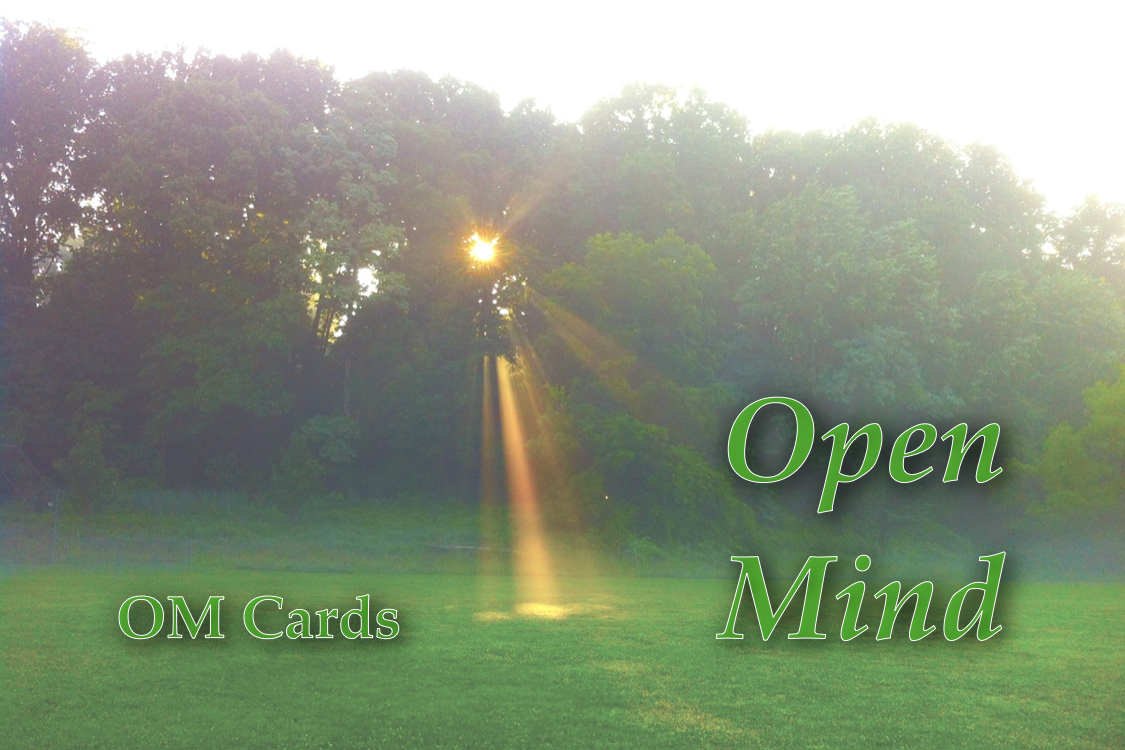 |
... and the box's bottom drops the distractingly mathematical last "0 - 1" column:
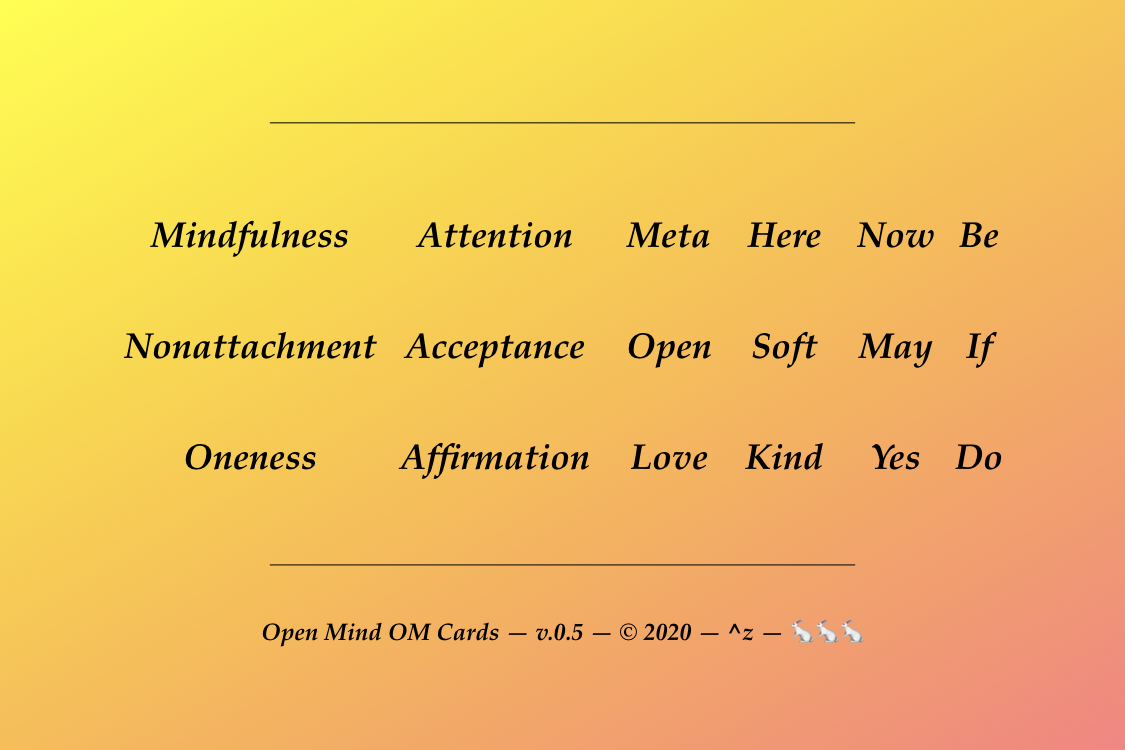 |
More changes, doubtless, to follow when the physical prototype set is delivered. Perhaps:
For a random OM Card click the "Om" link at the top of every ZhurnalyWiki page; to see all the OM Cards in alphabetical order go to the Om Museum.
(To get a physical deck of Om Cards see https://www.thegamecrafter.com/games/open-mind-om-cards ...)
- Tuesday, November 19, 2019 at 06:22:06 (EST)
In the 1998 profile of Mr Rogers by Tom Junod, "Can You Say ... Hero?", Fred Rogers meets a teenage child born with cerebral palsy who was raised in a bad environment and grew up frustrated, angry, and sad:
At first, the boy was made very nervous by the thought that Mister Rogers was visiting him. He was so nervous, in fact, that when Mister Rogers did visit, he got mad at himself and began hating himself and hitting himself, and his mother had to take him to another room and talk to him. Mister Rogers didn't leave, though. He wanted something from the boy, and Mister Rogers never leaves when he wants something from somebody. He just waited patiently, and when the boy came back, Mister Rogers talked to him, and then he made his request. He said, "I would like you to do something for me. Would you do something for me?" On his computer, the boy answered yes, of course, he would do anything for Mister Rogers, so then Mister Rogers said, "I would like you to pray for me. Will you pray for me?" And now the boy didn't know how to respond. He was thunderstruck. Thunderstruck means that you can't talk, because something has happened that's as sudden and as miraculous and maybe as scary as a bolt of lightning, and all you can do is listen to the rumble. The boy was thunderstruck because nobody had ever asked him for something like that, ever. The boy had always been prayed for. The boy had always been the object of prayer, and now he was being asked to pray for Mister Rogers, and although at first he didn't know if he could do it, he said he would, he said he'd try, and ever since then he keeps Mister Rogers in his prayers and doesn't talk about wanting to die anymore, because he figures Mister Rogers is close to God, and if Mister Rogers likes him, that must mean God likes him, too.
As for Mister Rogers himself ... well, he doesn't look at the story in the same way that the boy did or that I did. In fact, when Mister Rogers first told me the story, I complimented him on being so smart — for knowing that asking the boy for his prayers would make the boy feel better about himself — and Mister Rogers responded by looking at me at first with puzzlement and then with surprise. "Oh, heavens no, Tom! I didn't ask him for his prayers for him; I asked for me. I asked him because I think that anyone who has gone through challenges like that must be very close to God. I asked him because I wanted his intercession."
(cf This Is Water (2009-05-21), 2018-09-10 - Thank You, Mr Rogers, ...)
- Monday, November 18, 2019 at 05:36:01 (EST)
"I felt like a child at the grown-ups' table!" says Plato, of a meeting last week with some stratospheric-senior officers.
"Au contraire," Drs Peg & Pokey reply, "remember, you actually know something, and sharing your insight with them is a huge gift! Don't assume they're too stupid to appreciate that!" Dawn Patrol dodges puddles and fallen branches from last night's storms, pausing to pick up flotsam and set blown-over trash cans upright again.
"Those who are wisest say the least!" comments Pokey, and then continues a nonstop monologue, with asides on physicist Richard Feynman at Oak Ridge during WWII, letting-go of goals, the importance of yellow supergiant star Canopus for spacecraft navigation, and how mispronouncing words is the mark of a well-read person. In the men's locker room afterwards he introduces colleague-ultrarunner Jack to Plato, and shares a photo of Jack K from the Laverdo ultramarathon captioned, "An ultrarunning stud and some guy named Anton."
- Saturday, November 16, 2019 at 05:52:15 (EST)
This week in a beautiful personal essay "This Tom Hanks Story Will Help You Feel Less Bad" in the New York Times, writer Taffy Brodesser-Akner lists "four pillars of journalism" suggested by Mr Rogers. Changing just the first word, from Journalists to We, generalizes the four rules perfectly:
... so wise! More to follow concerning Fred Rogers (1928-2003), imperfection, justice, love, life, and awareness — and the 1998 profile of Mr Rogers titled "Can You Say ... Hero?" by Tom Junod ...
(cf 2018-09-10 - Thank You, Mr Rogers, ...)
- Friday, November 15, 2019 at 06:08:52 (EST)
"Then will he strip his sleeve and show his scars, / And say 'These wounds I had on Crispin's day.'" Plato rolls down a sock and shows Pokey the scabs on his ankle, where during his first marathon he had tucked away $2 in case of need. Ouch! Dawn Patrol rambles in the gloom through Pimmit Hills where an inflated Halloween dragon breathes faux fire.
"Don't let me slack off! Keep pushing!" We dash up hills; GPS glitches inside Starbucks add a fake 0.3 miles to the trackfile. A polite car stops and beeps to signal us to cross the road.
- Wednesday, November 13, 2019 at 04:52:52 (EST)
Thanks to encouragement-challenge by the inimitable, energetic, creative, kind Dr Kerry, there's now a set of online "One-Mind OM-Cards" here. For a random OM-Card click on the "Om" link at the top of every ZhurnalyWiki page; to see all the OM-Cards in alphabetical order go to the Om Museum.
The card layout, in brief, is simple — unlike a previous mindfulness-card experiment which built cards on-the-fly in the browser via CSS text overlays. OM-Cards consist of:
These OM-Cards were built using Apple's "Keynote" presentation-maker; prototype physical cards are about to be produced by The Game Crafter, in "Mint Tin" box format of 52mm x 87 mm (~2.0" x ~3.4"). Cards are most economical to print in multiples of 18, and a box holds at most 55; there are 54 OM-Cards at the moment.
The card-back design is from a stained glass ceiling light in a family friend's used book store many years ago:
 |
... and mint-tin boxtop art is from a Ken-Gar meadow sunbeam:
 |
... with mint-tin bottom a transposed adaptation of the Awakening Matrix:
 |
Will Attention-Acceptation-Affirmation soon sweep the world, thanks to One-Mind OM-Cards? As the cards say, "Om - Be Patient" about that, and "Om - Be Open" to the possibility — and of course "Om - Be Skeptical"!
(To get a physical deck of Om Cards see https://www.thegamecrafter.com/games/open-mind-om-cards ...)
- Tuesday, November 12, 2019 at 06:23:31 (EST)
| "Abstraction is the elimination of the irrelevant and the amplification of the essential." |
Mark Seeman's blog of October 2017 quotes Robert C Martin and goes on to explore:
... What's a good abstraction? As already quoted, it's a model that amplifies the essentials, etcetera. I think a good abstraction should also be intuitive.
What's the most intuitive abstractions ever?
Mathematics. ...
Seeman explains through the example of arithmetic:
... Notice that there's more than one way to combine numbers. You can add them together, but you can also multiply them. Could there be a common abstraction for that? What about objects that can somehow be combined, even if they aren't 'number-like'? The generalisation of such operations is a branch of mathematics called category theory, and it has turned out to be productive when applied to functional programming. Haskell is the most prominent example.
By an interesting coincidence, the 'things' in category theory are called objects, and while they aren't objects in the sense that we think of in object-oriented design, there is some equivalence. Category theory concerns itself with how objects map to other objects. A functional programmer would interpret such morphisms as functions, but in a sense, you can also think of them as well-defined behaviour that's associated with data.
The objects of category theory are universal abstractions. Some of them, it turns out, coincide with known design patterns. The difference is, however, that category theory concepts are governed by specific laws. In order to be a functor, for example, an object must obey certain simple and intuitive laws. This makes the category theory concepts more specific, and less ambiguous, than design patterns. ...
He summarizes and motivates:
... I believe that learning about these universal abstractions is the next step in software design. If you know design patterns, you have a vocabulary, but the details are still open to interpretation. If you know category theory, you have a better vocabulary. Just like design patterns, you have to learn these things, but once you've learned them, you've learned something that transcends a particular software library, a particular framework, a particular programming language. Learning about functors, monoids, and so on, is a good investment, because these concepts are rooted in mathematics, not any particular technology. ...
Worth learning for the long game of thinking better!
(cf Design Patterns and Category Theory (2019-06-12), ...)
- Sunday, November 10, 2019 at 05:46:07 (EST)
"Reversal of Fortune!" - a euphemism to describe what happens when a speed eater can't keep the goods down. Headlamp glow leads Dawn Patrol to Starbucks for the now-traditional cold-weather caffeine infusion. New codenames are discussed, along with machine learning technology readiness. Plato considers his next marathon; Peg correctly predicts Roadkill's response. Perhaps it's time for something completely different? Orion rides high in the southern sky. We ponder what we might not notice, recalling the parable in David Foster Wallace's "This Is Water":
There are these two young fish swimming along and they happen to meet an older fish swimming the other way, who nods at them and says, "Morning, boys. How's the water?" And the two young fish swim on for a bit, and then eventually one of them looks over at the other and goes, "What the hell is water?"
- Thursday, November 07, 2019 at 04:54:40 (EST)
"The Three Inseparables!" Athos, Porthos and Aramis - aka Square Peg, The Professor, and Pokey - enjoy a soggy jog with 30,000 friends. The 2019 Marine Corps Marathon is a recovery run after recent illness, overtraining, undertraining, and carousing. We carpool, take the Metro from East Falls Church into town, and during heavy rain find the nicest Starbucks in Rosslyn.
"Dr Z!" shouts somebody in the crowd as we cross the starting line. Pokey picks up a red mini-towel and wrings it out many times along the way. We meet Scottish level 10 Marathon Maniac Carolyn at mile 3, get a quick hug from Sean Hotchkiss at mile 9, and chat with Bill who is doing his 22nd MCM. Comrade Griz (aka Danger Man) waves at us as he runs the 50k and finishes it in 7 hours. Hanes Point is ankle-deep flooded. The sun comes out and we declare victory at mile 15, having done 3x more distance than planned. Thank you, amigos!
- Wednesday, November 06, 2019 at 04:46:41 (EST)
From Chapter 1 of Category Theory for Scientists by David Spivak (2013):
... I believe that the language and toolset of category theory can be useful throughout science. We build scientific understanding by developing models, and category theory is the study of basic conceptual building blocks and how they cleanly fit together to make such models. Certain structures and conceptual frameworks show up again and again in our understanding of reality. No one would dispute that vector spaces are ubiquitous. But so are hierarchies, symmetries, actions of agents on objects, data models, global behavior emerging as the aggregate of local behavior, self-similarity, and the effect of methodological context.
Some ideas are so common that our use of them goes virtually undetected, such as set-theoretic intersections. For example, when we speak of a material that is both lightweight and ductile, we are intersecting two sets. But what is the use of even mentioning this set-theoretic fact? The answer is that when we formalize our ideas, our understanding is almost always clarified. Our ability to communicate with others is enhanced, and the possibility for developing new insights expands. And if we are ever to get to the point that we can input our ideas into computers, we will need to be able to formalize these ideas first.
It is my hope that this course will offer scientists a new vocabulary in which to think and communicate, and a new pipeline to the vast array of theorems that exist and are considered immensely powerful within mathematics. These theorems have not made their way out into the world of science, but they are directly applicable there. Hierarchies are partial orders, symmetries are group elements, data models are categories, agent actions are monoid actions, local-to-global principles are sheaves, self-similarity is modeled by operads, context can be modeled by monads. ...
(cf Greatest Inventions (2011-06-09), Category Theory Concepts (2016-04-25), Ultimate Abstraction (2017-08-24), Why Care about Category Theory (2019-03-03), Yoneda Perspective (2018-10-03), ...)
- Tuesday, November 05, 2019 at 05:36:07 (EST)
"Apparently, we've made a decision!" says Keymaster, as Dawn Patrol dithers and then chooses street over sidewalk at an ambiguous construction divider. A few seconds later, "Car back!" We dart through the fence to safety, and discuss Generative Adversarial Networks ("... the coolest idea in machine learning in the last twenty years ...") along with how to be both empathetic and empowering to those who are chronically ill.
Coffee in hand, we analyze Keymaster's first marathon, Columbus, held just a few days ago. It was a great experience despite twinges in the final miles and a depleted phone battery. Back at our start, however: "I've forgotten my clothes!" Hmmmm - perhaps worth memorializing via a new trail name, if it happens again?
- Monday, November 04, 2019 at 04:50:35 (EST)
Thank you, Mary!
 | "A thousand times better!" Good Dr M rates how she feels today vs three weeks ago at the Clarence DeMar Marathon. The New Hampshire morning is crisp as we find our place at the back of the starting line crowd. |
 | "The terrifying rocky hill isn't quite that scary this time!" Roadkill discovers that memory can be deceiving; last year left an inaccurate recollection of how hard one segment was. Besides static displays of skeletons, ghosts, witches, etc., some participants wear costumes. The best is this unicorn-rider. |
 | Dr M runs 15 miles, continuing her recovery ramp-up. Roadkill rambles 30, half as far as last time, and decides to declare victory before nightfall. It's such a beautiful day! |
As always, infinite thanks to dear friend Mary for her awesome encouragement and kind company!
- Saturday, November 02, 2019 at 13:43:39 (EDT)
A pattern to ponder for mindfulness-nonattachment-oneness:
... as an array:
| 0 | — | ∞ |
|---|---|---|
| mindfulness | nonattachment | oneness |
| emptiness | empathy | empowerment |
| attention | acceptance | affirmation |
| meta | open | love |
| here | soft | kind |
| now | may | yes |
| be | if | go |
(cf Core Buddhism (2011-10-17), Meditation Map (2019-01-19), Awakening Matrix (2019-04-29), ...)
- Saturday, November 02, 2019 at 13:43:14 (EDT)
"Noooooooooooo!" The cry for caffeine echoes among officer towers as Dawn Patrol discovers Starbucks closed for a federal holiday. Two miles later a Peets Coffee infusion brings us back from a near-death experience. Whew!
"Machine Learning plagiarism," Keymaster tells about Siraj Raval, semi-celebrity-influencer-youtuber. As Vicki Boykis says, "He had all the skills necessary to command attention on the internet. But he didn't yet have the underlying technical skills to actually teach the content, or organization skills to run a course for learners." You have to have something to say.
"And I didn't fall down!" Keymaster describes yesterday's fast Army 10 miler. First marathon: next Sunday. Woot!
- Friday, November 01, 2019 at 04:46:10 (EDT)
Stanford professor Robert Sutton offers an updated (2018) list of "15 Things I Believe" that he shares with his organizational behavior students on the last day of class. Including the naughty words:
1. Sometimes the best management is no management at all -- first do no harm!
2. The best leaders have "the attitude of wisdom," the confidence to act on their convictions and the humility to keep searching for (and acting on) evidence that they are wrong.
3. Indifference is as important as passion.
4. The best leaders know what it feels like to work for them. They overcome the urge to focus attention on powerful superiors rather than their followers. They also resist the temptation to believe and reward those who butter them up with flattering bullshit (And make it safe for followers to tell them uncomfortable truths).
5. Fight as if you are right; listen as if you are wrong.
6. Fear the clusterfuck (or "clusterfug")--those debacles and disasters caused by a deadly brew of illusion, impatience, and incompetence that afflicts too many decision-makers, especially those in powerful, confident, and prestigious groups.
7. Big teams suck.
8. George Carlin was right. Too many people behave as if "my shit is stuff, and your stuff is shit." It creates a lot of unnecessary friction and frustration.
9. Hierarchy is good. Hierarchy is essential. And less isn't always better. Giving people orders, watching them work, and making decisions are things that ought to be done with care, caution, and compassion. But organizations and teams need hierarchy (and other bureaucratic trappings) to function.
10. If you are a winner and an asshole, you are still a loser in my book because you are harming so many other people in your lust to build something, make money, or dominate that competition.
11. Kurt Vonnegut was right. It is often more constructive to tell yourself "I have enough" than to keep asking how you can get more and more and more. I don't believe that people who die with the most money, fancy stuff, power, or prestige win the game of life.
12. If you are plagued by an asshole--or a pack of them--make a clean getaway if you can. If you can't, develop a strategy for protecting yourself and fellow victims from the onslaught, for preserving your dignity and spirit, and for fighting back.
13. "Am I a success or a failure?" is not a very useful question. It is better to ask "what am I learning."
14. Life is always going to be a bit messy, especially if you are doing something interesting and new. Try to create as much simplicity and clarity as you can, but embrace (and enjoy) the inevitable confusion and messiness too.
15. Jimmy Maloney was right. Work is an overrated activity.
(cf Family and Career (2005-11-30), Work of a Lifetime (2009-02-01), Nigel Marsh on Work-Life Balance (2011-02-25), Right Attitude (2013-08-03), Work as Practice (2014-09-05), Moments of Mindfulness (2016-09-15), ...)
- Wednesday, October 30, 2019 at 05:01:27 (EDT)
- Monday, October 28, 2019 at 04:54:20 (EDT)
"It's all one big taper!" says Griz. Meaning his preparation for imminent races? Or Life, writ large? K2 and Roadkill arrive at 6-dark-30 and survey the neighborhood, Starbucks blonde roast in hand. Bethesda Fine Arts Festival setup is underway in the street as we window-shop Anthropologie, then set off south-south-west with Ken & Griz. Shiny tanks of liquid nitrogen vent by Little Falls Trail, fog cascading into a ditch. Porquoi?
A side trail leads us out of the park and past Corps of Engineers facilities that process water for the District. GPS mega-glitches in the Dalecarlia Tunnel add a spurious 2.4 miles to the trackfile. Ken tells of a noir festival underway at the American Film Institute, and describes Roadside America, a huge indoor miniature village in Shartlesville PA. Super-cute dogs sit on command, tip heads toward their masters, and greet runners. A tiny terrier is excited to spy a chipmunk.
- Sunday, October 27, 2019 at 04:19:56 (EDT)
Oh My Goodness! — such a jumble of insight, preachiness, empathy, anecdote, wisdom, and buzzwordiness. The Buddha Walks into the Office by Lodro Rinzler (2014) is a stew that (cl)aims to be, as per its subtitle, "a guide to livelihood for a new generation". Or maybe not. Its author has been accused of sexual abuse, as have his teacher and so many others within American Buddhism. His book is chatty and fast-reading, encouraging and gentle. It's also obsessively first-person, a jarring tone from an ostensible advocate of selflessness and letting-go of ego. Logic is flimsy. Spirit is kind. Doctrine is distracting. Intention is positive. Execution is weak.
Positive features:
Distracting features:
Helpful thoughts:
(cf Buddha Buddy (2014-05-19), Flawed Gurus (2014-08-11), ...)
- Saturday, October 26, 2019 at 07:31:25 (EDT)
A zen-like mindfulness story told by Rabbi Michel Twerski titled "Pure Intentions":
The Dubner Maggid was once sitting and his wife came in and said that she needed money for something, I don't know, to buy food or something, and he didn't have any money so he told her that he didn't have any money, and when he realized that he couldn't help her he gave a "Krechtz". (in English, he sighed)
That sigh, for a person of his measure was considered something that was very serious. For righteous people the measure of judgement is very exacting. And he heard this divine echo saying: "You lost your portion in 'Olam Ha-ba'." (in English: the next world).
So at the first moment he was saddened, and then he suddenly became ecstatic. When they asked him about the change in mood, he said: "I heard this divine pronouncement saying that I have no portion in the world to come."
So he said, "That's terrible. It's catastrophic, but", then he said, "I realized that any time I do anything in spirituality, I pray, and I fulfill a commandment, learn Torah, whatever it is, I always question myself: Do I have an ulterior motive?" So he said, "I realized now that since they took away my reward in the next world, I don't have any more ulterior motives. I'm not gonna get anything — and I was so excited about the fact that now I could fulfill the commandments without an ulterior motive!"
"Unfortunately," he said, "when I began to experience that joy, I heard another pronouncement saying, 'OK, you get it back!'"
(cf Giving Up Hope (2014-09-01), Enlightenment Is Not (2015-07-06), No Goals (2016-06-08), Just Zazen (2017-01-29), Nothing But Mu (2017-04-22), Mantra - No Hope (2017-12-28), ...)
- Friday, October 25, 2019 at 06:11:36 (EDT)
"Strong beliefs weakly held!" suggests Keymaster — decisiveness, subject to change in the face of new evidence. Dawn Patrol trots briskly on a brisk morning to the coffee shop, rambles back through Pimmit Hills, then gets completely disoriented within an apartment complex. Maybe we're circling a black hole and it's rotating our coordinate system? Sunrise shifts to the southwest; the compass spins wildly; we're in a twisty maze of little cul-de-sac passages.
"Cute kits!" A ceramic family of faux foxes guards a garage. We find our way out of the maze and sprint back to work. Roadkill recommends Impro, a book on improvisational theatre by Keith Johnstone. "Just say 'Yes, and...' to everything!"
- Wednesday, October 23, 2019 at 04:57:11 (EDT)
"... amiability, friendliness, an expectation of shared attitudes (a proneness to easy 'mateship'), jocular toughness, good humour, and, above all, casual optimism ...", says linguist Anna Wierzbicka, of the archetypal Aussie style. Keymaster describes his comrade Liz's similar observations of runners. Huge virtues when training for a marathon, and perhaps at all other times in life?! Other characteristics, from Wikipedia on Mateship: "... shared experience, mutual respect, and unconditional assistance." Yes!
GPS mega-glitch adds two miles to the trackfile within Starbucks. Dawn Patrol meanders while musing about how birthdays are counted around the world in different societies, and how various parts of big organizations can be at war with one another. Happy Double Ten Eve!
(trackfile; cf No Worries, Mate (2012-11-24), ...)
- Monday, October 21, 2019 at 06:55:36 (EDT)
| "Twenty Six!" - "Point Two!" - "Go Navy!" - "Beat Army!" US Naval Academy runners form a circle, extend fists, shout call-and-response. Jeanne Larrison sings the "Star-Spangled Banner". And we're off! K2 and Roadkill set out too fast, as usual, and find plenty of miles on which to atone. En route to the race the car radio pumps out a perfect classic rock sound track: "Inside Out" (Eve 6), "Go Your Own Way" (Fleetwood Mac), "Pink Houses" (John Mellencamp), "Dreams" (Cranberries). Pumpkins paint a hillside orange. "I smell cows!" The 26.2 km "Metric Marathon" course meanders along rural roads, mansions overlooking rolling vistas, fields of corn stalks and soybean pods drying in the sun. Our Lady of Sorrows Church stands beside a cemetery with a dramatic angel tombstone. A stallion snorts and gallops around his pasture. We discuss systems thinking, first-person absolutist language, travel plans, family, and food. Volunteers from the Annapolis Striders greet runners and offer aid. Blisters throb, knees and hips twinge, calves cramp. It's a beautiful day for a country ramble with a friend! | 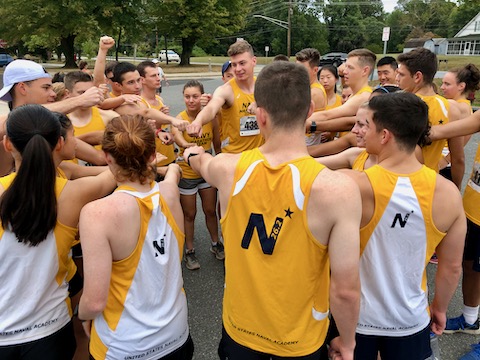 |
- Saturday, October 19, 2019 at 06:08:35 (EDT)
| Physics is the Operating System of the Universe |
... or so might a physicist suggest!
And from a completely different direction, Hasidic Rabbi Michel Twerski in a YouTube video says:
In reality, time is a seamless thing and we are all part of that seamless thing called time, and we plug into it, with the moments, and the minutes, and the way in which we we use those those moments in those minutes. We're affecting, we're investing, what we need to into time, and time and space and Torah (Law) and the human, the person's essence, and form of a human being are all one — and when a person does one Mitzvah (Commandment), it affects time and space and it reverberates through the entire Beri'ah (Creation). That's the power of a human soul, that it's all interconnected in a way in which the operating system is Torah and Mitzvot. The operating system, the OS of the Universe is Torah and Mitzvot.
... or, perhaps not such a different direction, if one thinks of the Universe as including mind and life as well as fields and particles, time and space, energy and matter, shape and number, ...
(cf Coming to Our Senses (2009-01-01), Total Interconnectedness (2009-12-25), Einstein on Self (2010-01-31), John W. Gardner on Personal Renewal (2011-02-08), Core Buddhism (2011-10-17), MLK on Oneness (2015-01-30), World as Ocean (2015-03-25), ...)
- Thursday, October 17, 2019 at 05:41:54 (EDT)
- Wednesday, October 16, 2019 at 05:38:35 (EDT)
"She's like Stephen Hawking!" Roadkill comments to Keymaster about how K2 simply smiles and listens as the kids debate philosophy, science, and Truth. ("Ask Nature!" said Hawking - cf Question Authority) Dawn Patrol sips coffee and rambles through Pimmit Hills while Rayleigh scattering subtracts shorter-wavelength photons to paint an amber sunrise.
"Hmmmm, 'Extremely constant'?" Keymaster ponders an oxymoronic phrase. We tread cautiously through the woods to Olney Park. No tripping on rocks or roots, please, with multiple marathons on the calendar for the coming weeks! How can the output of a neural network be properly interpreted as a probability? And how can hyper-busy end-users learn to use that information properly in their work?
"A crossing guard was posted here for Roadkill!" notes K2 when the friendly construction worker holds up her stop sign and blocks traffic just for us near the Metro. We analyze denial-of-service attacks and the tricky balance between trust and vulnerability, security and availability.
- Tuesday, October 15, 2019 at 05:22:40 (EDT)
"Ten common statistical mistakes to watch out for when writing or reviewing a manuscript" (by Tamar Makin and Jean-Jacques Orban de Xivry, 9 Oct 2019) suggests a set of pitfalls to beware of. Their abstract summarizes:
Inspired by broader efforts to make the conclusions of scientific research more robust, we have compiled a list of some of the most common statistical mistakes that appear in the scientific literature. The mistakes have their origins in ineffective experimental designs, inappropriate analyses and/or flawed reasoning. We provide advice on how authors, reviewers and readers can identify and resolve these mistakes and, we hope, avoid them in the future.
And in brief, their list:
... for any studies looking at the effect of an experimental manipulation on a variable over time, it is crucial to compare the effect of this experimental manipulation with the effect of a control manipulation. ...
... rather than running two separate tests, it is essential to use one statistical test to compare the two effects ...
... If a study aims to understand group effects, then the unit of analysis should reflect the variance across subjects, not within subjects. ...
... Spurious correlations most commonly arise if one or several outliers are present for one of the two variables. ...
... When a sample size is small, one can only detect large effects, thereby leaving high uncertainty around the estimate of the true effect size and leading to an overestimation of the actual effect size ...
... recycling the same data to first characterise the test variables and then to make statistical inferences from them, and is thus often referred to as 'double dipping' ...
... the more variation in one's analysis pipeline, the greater the likelihood that observed effects are not genuine ...
... When performed with frequentist statistics, conducting multiple comparisons during exploratory analysis can have profound consequences for the interpretation of significant finding ...
... a non-significant p-value does not distinguish between the lack of an effect due to the effect being objectively absent (contradictory evidence to the hypothesis) or due to the insensitivity of the data to enable to the researchers to rigorously evaluate the prediction (e.g. due to lack of statistical power, inappropriate experimental design, etc.). In simple words - non-significant effects could literally mean very different things - a true null result, an underpowered genuine effect, or an ambiguous effect ...
... Just because variability of two variables seems to linearly co-occur does not necessarily mean that there is a causal relationship between them, even if such an association is plausible. For example, a significant correlation observed between annual chocolate consumption and number of Nobel laureates for different countries (r(20)=.79; p<0.001) has led to the (incorrect) suggestion that chocolate intake provides nutritional ground for sprouting Nobel laureates ...
(cf Small Number Illusions (1999-08-04), Correlations and Causality (2000-04-09), Science and Pseudoscience (2001-10-06), Square Root of Baseball (2005-05-13), Statistics - A Bayesian Perspective (2010-08-13), Medicine and Statistics (2010-11-13), Introduction to Bayesian Statistics (2010-11-20), Doing Bayesian Data Analysis (2013-11-02), Probability Theory, the Logic of Science (2013-11-18), Statistical Hypothesis Inference Testing (2013-12-01), P-Hacking (2014-09-20), Causal Inference in Statistics (2018-09-16), ...)
- Monday, October 14, 2019 at 04:57:08 (EDT)
"You need a new trail name!" K-Rex declares, when Roadkill refrains from crawling through a web of yellow caution tape at the entrance to Lewinsville Park. Signs warn that the pedestrian bridge is under construction, and pre-sunrise darkness makes the creek invisible within the dense woods. So why this sudden display of common sense? Some mysteries may never be explained. At McLean High School's track Dawn Patrol is again stymied, this time by a chained-shut padlocked fence. But "... neither snow, nor rain, nor heat, nor gloom of night can stay" the quest for caffeine. K2 leads the way to a neighborhood cut-through. Keymaster explains category-theoretic issues of monoids and functors.
"We have corrupted the Youth of Athens!" declares Roadkill during the return trek from Starbucks, not realizing that Keymaster's alma mater is Ohio University in Athens. Management and Labor take turns covering ears to avoid overhearing each other. Can quantum mechanics explain the mind-matter problem? Are we going to slip and fall on the walnuts that bestrew the ground? Unanswered questions abound on a warm and humid morn. A super-speedy bunny sprints across a lawn.
- Sunday, October 13, 2019 at 04:51:55 (EDT)
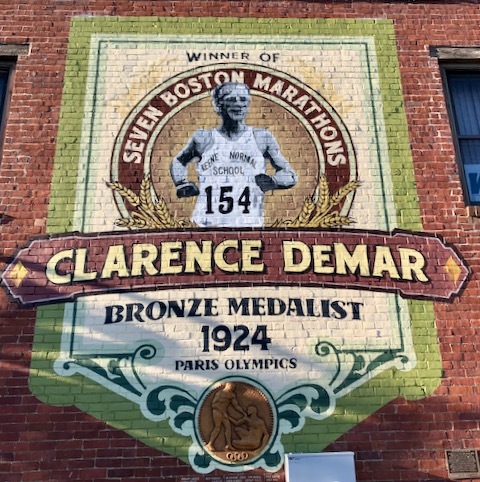 | "Happy Birthday!" Dr Mary and Roadkill both celebrate personal milestones at the Clarence DeMar marathon in Keene NH. A mural honoring the local hero, "Mr DeMarathon", decorates a wall near packet pickup. |
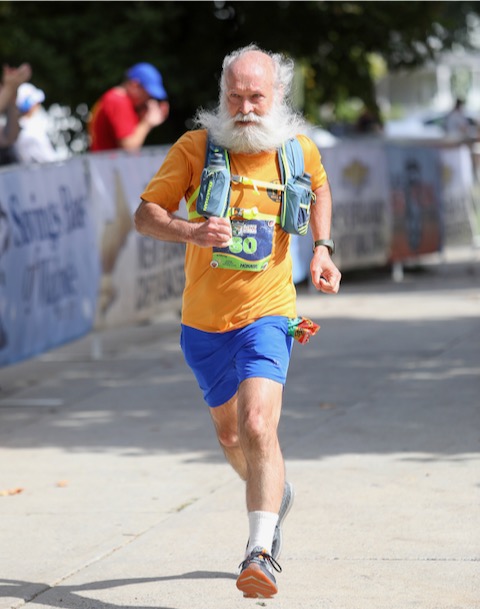 | "Thank you, Mary!" Roadkill pushes the pace in the final miles and comes in officially in 5:57, in his age group 25th of 26. (Finish line photo courtesy of Millennium Running.) |
- Saturday, October 12, 2019 at 11:21:06 (EDT)
From a fascinating 2019 interview with Adam Gordon Bell — "Category Theory is in our minds? Bartosz Milewski weighs in." — as presented by John Walker, comments by Milewski:
... I think mathematics is something that is inherent to human beings. This is the only way we can deal with our environment because we have small brains. It's like, compared to the size of the universe, this is just like a tiny, tiny thing. And it evolved from apes that were trying to solve problems, like how to run away from a predator or how to kill an animal and eat it, start a fire, and so on. So the way we deal with complexity is by dividing into smaller tasks, solving them and then recombining the solutions. And that's what we do with everything. ...
and near the end:
... We always think that like we already understand 99% of stuff and there's this 1% missing. And I think this is completely wrong. We understand the 0.001% if that even makes sense, right? And there's so much stuff missing if we just ignore the stuff that we don't understand. ...
and:
... physicists are very pragmatic, you know; if it works, it works. Okay. If I can calculate something and then test it, then it's great. In this way, physicists are more like programmers. If it works let's ship it. ...
and completely separately from Bartosz Milewski's blog on 9 October 2019:
In category theory, as in life, you spend half of your time trying to forget things, and half of the time trying to recover them. A morphism, the basic building block of every category, is like a defective isomorphism. It maps the initial state to the final state, but it provides no guarantees that you can recover the original. But it seems like this lossiness is what makes morphisms useful.
There are people who can memorize mathematical formulas perfectly but have no idea what they mean. And there are those who get just the gist of it, but can derive the rest when needed. Somehow understanding is related to lossy compression.
We can't recover lost information. Once it's gone, it's gone. All we can do is to try to figure out what the original might have been like. In fact, knowing how the information was lost, we might be able to generate all possible inputs that could have led to a given output. It's the closest we can get to inverting the uninvertible. This is the main idea behind fibrations.
Let me illustrate this concept with an example. Consider the function ...
(cf Greatest Inventions (2011-06-09), Cakes, Custard, and Category Theory (2016-02-14), Category Theory Concepts (2016-04-25), Bird's-Eye View (2016-07-20), Category Theory for Programmers (2017-05-12), Ultimate Abstraction (2017-08-24), Eugenia Cheng on Thinking (2017-12-30), Yoneda Perspective (2018-10-03), Put the Vast Storehouse in Order (2017-10-04), Category Theory is like a Lighthouse (2018-12-24), Macro vs Micro (2019-02-03), Why Care about Category Theory (2019-03-03), ...)
- Friday, October 11, 2019 at 04:52:28 (EDT)
A preview-review of The Six Secrets of Intelligence by Craig Adams, due out late 2019, gives away the "secrets":
... all obviously important, albeit as listed neither as orthogonal nor as complete as one might hope. Online sample text suggests a chatty, preachy book that begins with Aristotle and educational history, then turns to a discussion of the "Six Secrets" with examples from current events, followed by sections on psychology, philosophy, education, and society. Reviewer Arlene Holmes-Henderson rates it "... light on cognitive science, but it does provide a toolkit for analysing political debates and philosophical discussions ...".
Good enough — but why not take the time to provide a proper summary, a solid structure with bottom-line-up-front (BLUF) takeaways? And how about a well-designed framework for the "Secrets", making their interrelationships and dependencies and hierarchical relationships clear, memorable, and useful?
"Thinking Better" techniques should be applied to teach better thinking. As category theorist Eugenia Cheng notes in a mathematical context:
To study the world abstractly you use science; to study science abstractly you use math; to study math abstractly you use category theory. Each step is a further level of abstraction. But to study category theory abstractly you use category theory.
Ditto mind and metacognition ...
(cf Mental Bandwidth Boosters (1999-06-26), Characteristics of Superforecasters (2015-11-21), Think Better - Three Keys (2019-06-05), More Meta (2019-08-31), ...)
- Thursday, October 10, 2019 at 05:48:10 (EDT)
"Productive morphology! Back-formation!" Keymaster explains metalinguistic concepts when Roadkill asks how to say "un-dead" in Spanish. Dawn Patrol pushes the pace for the first three miles and discovers a dead-end playground before standing in line for coffee. And would a Category Theorist call it "co-coffee" if the normal route there is reversed? And is everything Zen? "I don't think so ..."
- Wednesday, October 09, 2019 at 04:55:25 (EDT)
"You bring us to life!" Roadkill praises the blushing baristæ as Dawn Patrol, seeking caffeine, pauses at Starbucks. High humidity and early meetings mandate a short trek. Keymaster reports on experiments with new gear, the perils of dehydration, and an overheated weekend runner found fallen on the W&OD Trail; a local rescue squad came to assist. The eastern horizon brightens from rich apricot to tupelo honey. Upcoming marathons will offer us opportunities to let go of goals and practice accepting what is. Thank you, World!
- Tuesday, October 08, 2019 at 05:29:44 (EDT)
- Monday, October 07, 2019 at 05:40:29 (EDT)
Is there a significant metaphorical-mapping between the classical-mythic "Four Elements" and the awakening-awareness aspects of Attention + Acceptance + Affirmation? Maybe just symbol play-poetry:
... and if so, where then is Earth? — the foundational slow-solid-stolid substrate on which being-itself exists?
Perhaps this is just an amusing diversion, at most marginally useful in creative discovery of more patterns, or as a mnemonic device? (Or not!)
(cf Google Trends (2006-05-27), Be Earth (2010-12-07), Core Buddhism (2011-10-17), 0-1 (2014-08-29), Elements (2015-06-02), Golem and Jinni (2016-06-10), The Elements (2017-10-24), Meditation Map (2019-01-19), Awakening Matrix (2019-04-29), ...)
- Sunday, October 06, 2019 at 05:09:23 (EDT)
| Murals decorate the Georgia Avenue underpass at the train tracks. Sligo Creek takes us upstream past the Capital Beltway. A peachy sunrise lightens the horizon. |  |
- Saturday, October 05, 2019 at 05:21:54 (EDT)
"Its slogan is, 'We are heterofriendly'!" Keymaster tells of the Axel Hotel in Berlin. Orion fades and a saffron sunrise starts to glow as Dawn Patrol dashes to the McLean High School track to blast a lap. A cut-through at Bryn Mawr Park soon leads to Starbucks. Roadkill describes a milk stout; Keymaster counters with a beer plus carbonated-lemonade blend. Biermischgetränke? Ausgezeichnet!
- Friday, October 04, 2019 at 04:36:34 (EDT)
| The two argue and agree: Each interpreting the other Each annoying the other Each confirming and refuting the other A couple, each loving the other And pretending not to need the other — Although each would, like a child in a circus crowd, Be lost without the hand of the other. |
(after reading Billy Collins and seeing an elderly pair on a train)
- Wednesday, October 02, 2019 at 04:30:34 (EDT)
"Right answer!" declares Roadkill, when a fellow runner says she's not training for anything special. The dash to General Getty Park is at 9.3 min/mi pace, after which Danger Man leads the way along Sligo Creek to the track. Feats of strength accompany a brisk 1:46 lap. At the elementary school a compass rose decorates the playground. Bronze eagles guard a gate. Curly calligraphic chalk commands "Joy". Yes!
"To the Virgins, to Make Much of Time?" Roadkill struggles to recall the source of the phrase "Time's wingéd chariot". He guesses Emily Dickinson or John Donne, neither of which is correct. (It's by Andrew Marvell, in the carpe diem poem "To His Coy Mistress".) Blisters on the left foot, twinges in the right - clearly more mileage and speedwork are needed!
- Tuesday, October 01, 2019 at 07:34:58 (EDT)
- Sunday, September 29, 2019 at 03:28:31 (EDT)
"Three tall hot blondes!" Alas, at this early hour the baristae don't have quite enough light roast coffee available. "No worries - just leave LOTS of room for cream!" Inside the new Starbucks a wild GPS glitch teleports Dawn Patrol a bonus 2.2 miles as we await caffeine. The new bridge over the Beltway is still closed to pedestrians - uh, officially, that is. On the other side Keymaster describes a "soft recommendation" he recently made that helped a decision maker. K2 and Roadkill offer gratuitous first-marathon advice for how to avert chafing on delicate body parts. The Trail Talk is strong in these ones!
"Never leave a pair of chopsticks stuck vertically in the rice!" We discuss superstitions - or rather, social traditions based on metaphors - in other cultures. The number four, writing someone's name in red, alternative number systems for counting money ...
- Saturday, September 28, 2019 at 07:10:21 (EDT)
From "Novelist Cormac McCarthy's tips on how to write a great science paper" in Nature (2019-09-26), abridged from their presentation by Van Savage and Pamela Yeh:
(cf Syntactic Sugar (2006-05-02), Pulp Fiction Rules (2008-10-20), Rules for Writing (2010-03-07), Tips for Aspiring Op-Ed Writers (2017-11-18), ...)
- Friday, September 27, 2019 at 19:31:51 (EDT)
"Mud!" warns K-Rex as we dash through the darkness toward Starbucks. "Oops!" says Roadkill behind her, skidding across the slippery sidewalk. Thankfully neither falls. Only one member of Dawn Patrol has brought a flashlight. (Blame the lack of caffeine?) For the return journey we meander along neighborhood connector paths, K2 leading the way until - "Oops!" - a spiderweb catches her across the face. Keymaster explains his choice of hot coffee despite a humid-warm morning: the cognitive dissonance that iced coffee provokes. Maybe work on letting go of expectations? We muse about the ocean of metaphorical lemonade that bumper crops of lemons sometimes gift us with. Floral ironwork on a mailbox catches eyes.
- Thursday, September 26, 2019 at 04:50:55 (EDT)
"Rabbit #6!" counts K2 as a quick bunny scampers away. Sunday's 19+ mile Dawn Patrol trek begins in darkness at 6:09 AM. Within the first block Roadkill glimpses a glint on the street, backtracks, and picks up a shiny dime. Profit! A passing runner confirms the W&OD Trail route. At sunrise we turn onto the Custis Trail, pause for coffee, then continue through Rosslyn to the Mount Vernon Trail. South of the airport fishermen cast lines into Four Mile Run. The path upstream takes us by Weenie Beenie and back onto the W&OD. Today's experiment in speed control works well: we run only brief segments, walk the hills, and still average ~13 min/mi overall.
"New England candymakers created sweet-brittle honeycomb bars like that," K2 reminisces, as Roadkill compares chocolate-coated Australian "Violet Crumbles" to British "Crunchies". New pack and new shoes work well, modulo minor chafing. Big mistake: poor hydration. Dizzy Roadkill belatedly quaffs a quart of Gatorade at mile 15, after which run-walk tactics between alternate power line poles close the loop. A beautiful bright butterfly-wing patterned running-skirt lures roving eyes. (Guess whose!) Trail talk covers organizational innovation, metacognitive methods, and food.
- Wednesday, September 25, 2019 at 04:33:05 (EDT)
From writer Robert Brockway, an insightful essay in, of all places, Cracked: "5 Great Joys in Life That Healthy People Never Experience" (June 2012). It begins:
I, like many of you, am a genetic wreck.
I am not supposed to be alive right now. If humanity still functioned on any sort of evolutionary logic, I would probably have a brief but successful career as a lion's afternoon entertainment, instead of being what I am now, which is a Mildly Successful Internet Thing. I possess a slew of health problems, chemical deficiencies, mental aberrations and spiritual monstrosities that I manage every day by the grace of medical science and an oblivious culture that not only tolerates but nurtures weakness (thanks, guys!).
Sometimes, I get bitter about my situation. I watch the powerful and healthy from afar, while I squat here in the damp shadows of disease, nurturing my resentment like a hypothyroid, myopic Gollum. But there are some joys in life that the hale, hearty, happy and healthy will never know ... the simple pleasure of ...
... and goes on to list Brockway's five great joys (here, omitting many Bad Words and Naughty Images):
Talk about Mr Pollyanna, and wise application of the metacognitive principles of reversal and reframing.
Awesome Optimism!
(cf notes on Brockway's earlier essay "Level Up" (2011-12-30), ...)
- Tuesday, September 24, 2019 at 05:29:04 (EDT)
| Spider-flowers (Cleome spinosa) explode in a curbside garden of stamens and pistils, ivory and fuchsia. A cute corgi reenacts the Futurist painting "Dynamism of a Dog on a Leash". |  |
- Monday, September 23, 2019 at 04:30:38 (EDT)
"Corgi!" Keymaster spies a pup ahead; Roadkill pauses for a photo and texts it to BFF Alice. Starbucks offers Dawn Patrol a constellation of coffee choice. Metalinguistic trail talk topics include metaphors in different cultures and machine learning training data for language analytics.
"What's in a name?" Roadkill quotes Alan Perlis, "The best book on programming for the layman is Alice in Wonderland, but that's because it's the best book on anything for the layman." Re name-value distinction, he cites a scene in Through the Looking-Glass:
' ... The name of the song is called "Haddock's Eyes." '
'Oh, that's the name of the song, is it?' Alice said, trying to feel interested.
'No, you don't understand,' the Knight said, looking a little vexed. 'That's what the name is called. The name really is "The Aged Aged Man." '
'Then I ought to have said "That's what the song is called"?' Alice corrected herself.
'No, you oughtn't: that's quite another thing! The song is called "Ways and Means": but that's only what it's called, you know!'
'Well, what is the song, then?' said Alice, who was by this time completely bewildered.
'I was coming to that,' the Knight said. 'The song really is "A-Sitting on a Gate": and the tune's my own invention.'
(trackfile; cf True Names (2003-10-16), ...)
- Sunday, September 22, 2019 at 05:41:31 (EDT)
Tribal Leadership: The Key To Building Great Teams by Dave Logan (with John King and Halee Fischer-Wright) is yet another easy-reading business storybook, focused on what many middling managers enjoy hearing and already believe (like Drive). It's hugely first-person, full of name-dropping anecdotes of semi-famous folks whom the authors interviewed and breathlessly quote. Negative evidence? Not much. Confounding factors? The rôle of luck? The value of self-criticism? Ditto.
The goodness of Tribal Leadership is important: think meta, as applied to levels of self-actualization for individuals and teams. A Busy Executive Summary (adapted from Michael Batko's notes and the Farnham Street blog) might be to see organizations in five stages:
| Stage | Themes | Motto | Characteristics |
|---|---|---|---|
| 1 | Alienation & Hostility | "Life Sucks" | Gangs → the lowest form of culture, rarely encountered outside prison-like situations |
| 2 | Separation & Apathy | "My Life Sucks" | Apathetic victims → "Other people's lives seem to be working, but mine sucks." |
| 3 | Superiority & Heroism | "I'm Great" | Dyads and dominant-submissive relationships → "I'm great" with the unstated "and you're not"; people try to outperform one another on an individual basis and put one another down, often under a veil of humor; a lone warrior culture, the "wild, wild west"; trust must be earned |
| 4 | Teaming & Pride | "We're Great" | Triads and values-based relationships → "We're great" with the unstated "and they aren't" (another tribe, company, competition); together, radiate tribal pride; trust is assumed |
| 5 | Transcendence | "Life is Great" | Relationships with all whose values resonate → there is no "they"; Stage 5 cultures are history-making, so far ahead that competition is irrelevant, e.g., "We are defeating cancer", not "We want to be #1" |
And then? As wise comrade "Alice" asks, What happens beyond Stage 5?
Maybe Oneness? Pure Being? Total Wonder?
(cf How Great Thou Art (2005-03-16), ...)
- Saturday, September 21, 2019 at 05:49:06 (EDT)
"In Japanese the studio name is 'Jiburi' - from the Italian 'Ghibli' - from the Libyan-Arabic word for a desert wind!" Keymaster explains, "The goal was to blow a hot breeze through the tired anime industry." Dawn Patrol, feeling tired and hot, runs a few steps before settling into a stroll. We arrive at Starbucks only to discover it closed. Sad!
"Don't say 'Sorry', say 'Thank you for understanding!'" Roadkill chides an apologetic employee, locked out like us, when she begs forgiveness. The boss who holds the keys is nowhere to be found, over an hour late. A smiling construction worker is a helpful crossing guard as the decaf duo hikes back to work. Conversation covers the super-efficient SpaCy machine learning library and a critique of Dan Pink's business-motivation book Drive.
- Friday, September 20, 2019 at 04:48:06 (EDT)
(cf 2004-08-29 - Mad Dog Zimmarathon + 2006-10-28 - Mad Dog Zimmarathon Plus + 2007-08-18 - Mad Dog Zimmarathon 2007 + 2011-07-16 - Mad Dog Zimmarathon 2011 + 2014-05-18 - Solo Zimmarathon for past journeys along this route)
- Thursday, September 19, 2019 at 05:41:31 (EDT)
From Charlotte Joko Beck's talk "Attention Means Attention", quoted from Nothing Special: Living Zen in Tricycle magazine Fall 1993:
... every moment in life is absolute in itself. That's all there is. There is nothing other than this present moment; there is no past, there is no future; there is nothing but this. So when we don't pay attention to each little this, we miss the whole thing. And the contents of this can be anything. This can be straightening our sitting mats, chopping an onion, visiting someone we don't want to visit. It doesn't matter what the contents of the moment are; each moment is absolute. That's all there is, and all there ever will be. If we could totally pay attention, we would never be upset. If we're upset, it's axiomatic that we're not paying attention. If we miss not just one moment, but one moment after another, we're in trouble. ...
(cf This (2013-03-09), Listen to the Traffic (2014-11-12), No Drama (2015-01-16), Attention (2015-03-03), Mantra - Attention, Attention, Attention (2017-05-27), This Moment (2019-01-09), ...)
- Wednesday, September 18, 2019 at 04:40:27 (EDT)
"He's an idiot!" Keymaster objectively and critically evaluates a celebrity socio-linguistic-evolutionary-psychological popularizer's research and publications. "Hinky and sexist!" A carotene sunrise brightens the horizon; we scan for new planets but find none. Roadkill feels vertigo, or perhaps is just dizzy with the joy of an early run? K2 waves hands, casting a "dispel cobwebs" enchantment as she leads Dawn Patrol's return from its quest for caffeine.
- Tuesday, September 17, 2019 at 06:00:06 (EDT)
Dan Pink's book Drive: The Surprising Truth about What Motivates Us is another brick in the thick genre-wall of business-motivational tomes. It features some modern psychology and neuroscience — along with a lot of feel-good self-justification aimed at managers and executives. No need to pay people (beyond a fuzzily-undefined baseline); just give them "Autonomy" and "Purpose", let them seek and achieve "Mastery", and they will work hard for you. No need to cite evidence that disagrees with your hypothesis. No need for nuance.
That's a caricature of Drive, and it's unfortunately accurate. Pink focuses on folks who are successful, celebrities, the winners of the race, those who are already living in the nice neighborhood with the multi-car garage. There's not much thought given to those who fell short, and why they failed. Not much about assisting one another over rough patches, or about the need that everyone has for help when young or aged, ill or injured. We're all broken at one time or another, all need patching. There's not much charity or love in Drive.
And alas, there's the attempt to define new jargon, in the apparent hope that it will catch on and give the author a bit of extra stickiness, some enduring fame in the meme-o-sphere. Pink's proposed terminology isn't worth mentioning; it's derivative and unnecessary. For better science, try Ariely and Kahneman et al.
- Monday, September 16, 2019 at 06:19:12 (EDT)
"What's the minimum change needed to get a novel result?" Keymaster wonders - not just the smallest quantum of publishability, but something new and worthwhile? Hard to know, especially in a field that evolves as fast as machine learning. Dawn Patrol discovers a new cut-through between Westbranch and Galleria, greets a tiny dog, and discusses natural-language processing. Roadkill forgets his phone this morning and enjoys app-free coffee all the more when someone else pays.
- Sunday, September 15, 2019 at 06:19:29 (EDT)
"Elementary, my dear Roadkill!" replies Keymaster, to a question about the type of school that Liz, his Significant Other, now works at. A waning crescent moon peeks through clouds as Dawn Patrol trots via headlamp-glow in search of caffeine. GPS glitching adds a bogus half-mile inside Starbucks, where the cashier flaunts dramatic double-cat-tail eyeliner and the iced coffee now comes with a sippy-cup lid to obviate the need for a straw.
- Saturday, September 14, 2019 at 05:38:07 (EDT)
From Noam Shpancer's blog in Psychology Today, a February 2019 post "Decision-Making for Sound Mental Health: 3 Useful Principles":
... wise strategies!
- Friday, September 13, 2019 at 04:41:39 (EDT)
- Thursday, September 12, 2019 at 05:29:37 (EDT)
- Wednesday, September 11, 2019 at 04:41:56 (EDT)
Momo (1973) is an extended parable about time and mindfulness by Michael Ende, author of The Neverending Story. The title character is a little homeless girl whose superpower is listening — and her listening catalyzes awakening for those around her. In the original German its full name is Momo oder Die seltsame Geschichte von den Zeit-Dieben und von dem Kind, das den Menschen die gestohlene Zeit zurückbrachte, which translates into English as, "Momo, or the strange story of the time-thieves and the child who brought the stolen time back to the people".
Evil cigar-smoking Grey Men take away time from human victims, who are left in helter-skelter unhappy busy-ness. With the help of a communicative tortoise and a mysterious time-master, Momo saves the world. It's a sweet story, allegorical and kind-hearted, rather preachy in places, rather important in its sermon. The translation is by J. Maxwell Brownjohn. In Chapter 12 ("Nowhere House") there's a lyrical passage that D B Davis on the discussion group rec.arts.sf.movies quotes as his favorite. It's the heart of Momo:
Everything was bathed in a sort of golden twilight.
When her eyes became accustomed to it, Momo saw that she was standing beneath a mighty dome as big as the vault of heaven itself, or so it seemed to her, and that the whole of this dome was made of the purest gold.
High overhead, in the very centre of the dome, was a circular opening through which a shaft of light fell straight on to an equally circular lake whose dark, smooth waters resembled a jet-black mirror.
Just above the surface, glittering in the shaft of light with the brilliance of a star, something was slowly and majestically moving back and forth. Momo saw that it was a gigantic pendulum, but one with no visible means of support. Apparently weightless, it soared and swooped above the mirror-smooth water with birdlike ease.
As the glittering pendulum slowly neared the edge of the lake, an enormous waterlily bud emerged from its dark depths. The closer the pendulum came, the wider it opened, until at last it lay full-blown on the surface.
Momo had never seen so exquisite a flower. It was composed of all the colours in the spectrum — brilliant colours such as Momo had never dreamed of. While the pendulum hovered above it, she became so absorbed in the spectacle that she forgot everything else. The scent alone seemed something she had always craved without knowing what it was.
But then, very slowly, the pendulum swung back, and as it did so Momo saw to her dismay that the glorious flower was beginning to wilt. Petal after petal dropped off and sank into the blackness below. To Momo, it was as if something unutterably dear to her were vanishing beyond recall.
By the time the pendulum reached the centre of the lake, the flower had completely disintegrated. At the moment, however, a new bud arose near the opposite shore, and as the pendulum drew nearer Momo saw that an even lovelier blossom was beginning to unfold. She walked around the lake to inspect it more closely.
This new flower was altogether different from its predecessor. Momo had never seen such colours before, but these colours seemed richer and more exquisite by far. The petals, too, gave off a different and far more delicious scent, and the longer Momo studied them the more marvelous in every detail she found them.
But again the glittering pendulum swung back, and as it did so the glorious blossom withered and sank, petal by petal, into the dark and unfathomable depths of the lake.
Slowly, very slowly, the pendulum proceeded on its way, but not to exactly the same place as before. This time it checked its swing a little way further along the shore, and there, one pace from where it had previously paused, another bud arose and unfolded.
To Momo this seemed the loveliest lily of all, the flower of flowers — a positive miracle. She could have wept aloud when this perfect blossom, too, began to fade and subside into the depths, but she remembered her promise to Professor Hora and uttered no sound.
Meanwhile, the pendulum had returned to the opposite shore, another pace further along, and a fresh bud broke the glassy surface.
As time went by, it dawned on Momo that each new blossom differed entirely from those that had gone before, and that it always seemed the most beautiful of all. She wandered around the lake watching flower after flower unfold and die.
Although she felt she would never tire of this spectacle, she gradually became aware of another marvel — one that had escaped her till now: she could not only see the shaft of light that streamed down from the centre of the dome; she could hear it as well.
At first it reminded her of wind whistling in distant treetops, but the sound swelled until it resembled the roar of a waterfall or the thunder of waves breaking on a rocky shore.
More and more clearly, Momo perceived that this mighty sound consisted of innumerable notes whose constant changes of pitch were forever weaving different harmonies. It was music, yet it was also something else. All at once, she recognized it as the faraway music she had sometimes faintly heard while listening to the silence of a starry night. ...
... a dreamlike vision of Life, unique and precious, transient and immortal.
(cf "Why a Classic German Children's Tale Is Ripe for Revisiting" by Giulia Pines in The Atlantic (2018-03-12), ...)
- Tuesday, September 10, 2019 at 06:07:14 (EDT)
"Doesn't look good!" admits Roadkill, as the path through brushy weeds becomes increasing narrow, boggy, and overgrown. Dawn Patrol turns back, bushwhacks along a faint deer track, and emerges at the Nottoway Park community gardens. We proceed south past the Vienna Metro Station and return via Nutley Street.
"It does text-to-speech synthesis, with a slider to vary the pronunciation across regions!" Keymaster explains. A turkey vulture stands statue-like atop the roof ridge of a small neighborhood home, surveying its domain. Fried Friday morning commuters honk at jaywalkers.
- Sunday, September 08, 2019 at 04:39:34 (EDT)
"If they're talking about work too long, just ask a food question!" Roadkill faux-whispers to Keymaster. K-Rex shifts gears and describes the gourmet breakfast that her son and daughter recently prepared. "They belong on MasterChef!" Dawn Patrol agrees. A big red fox finishes his snack and dashes away at our approach. A doe and her fawn cross the street ahead. Sunrise pinks the eastern horizon.
"Teach them Category Theory!" advises Keymaster, as a way to help those who want to spur innovation in their organizations. K2 recommends creative colleagues who can catalyze change. We finish the run early to make morning meetings.
- Saturday, September 07, 2019 at 05:46:30 (EDT)
From August 2019's "5 ways to develop metacognition in your classroom" by Dr Tony Cotton:
... and to eat our own cooking and be meta-meta, can we ask ourselves to execute the above 5 steps on this very discussion?
(rather obviously for #5: write a ZhurnalyWiki page "Metacognitive Classroom"!)
(cf Reflective Students (2004-03-17), Thinking in Systems (2017-11-03), Teach Yourself How to Learn (2018-03-05), Metacognitive Awareness (2018-05-19), ...)
- Friday, September 06, 2019 at 04:51:37 (EDT)
 | "You look like the kind of person who would do this crazy thing!" says a fellow runner at high noon with temps in the upper-90s & lower-100s. We're about to start the Habanero Hundred in east central Texas - though note that Roadkill is just doing the 10k single-lap option. Thank goodness, given mega-sunburn within 90 minutes! |
| After the first mile reality sets in and pace slows to a walk for most of the journey, with a faux-sprint to the finish line when people are watching. Eye-catching Texas flag gear abounds. The course meanders along horse trails through scrub brush land of the 7iL Ranch near Cat Spring. The owner, Faye, is friendly and helpful. She's in her 70s and tells of a Swiss "Zimmermann" great-grandparent. Since her father had only daughters, she got to do the herding, branding, castrating, etc. Mega-kudos to DD/Keith & DSiL/Rita for cheering (and enabling) this humbling experiment in high heat and humidity; hats-off to Trail Racing Over Texas for its great management and attitude. Official 10k results: 25th place of 85 finishers, 90.1 minutes, first (and last!) over age 65, first (of 2!) from outside Texas. | 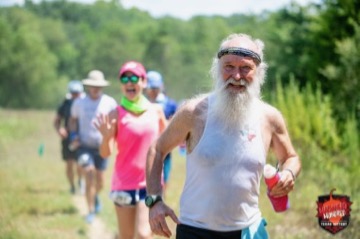 |
- Thursday, September 05, 2019 at 05:52:03 (EDT)
"Australian Pink Floyd?" With a tribute band concert to attend in a few days, and feeling comfortably numb without morning coffee, K2 and Roadkill open the gates of Dawn Patrol and wish you were here. Time is tight before early meetings, so it's run like hell to put another brick in the wall of training for upcoming fall marathons. Hey you!
- Wednesday, September 04, 2019 at 04:35:42 (EDT)
Describing data, concepts, or strategies in terms of Three Things often offers a fun, fertile framework for better thought:
... and when feasible, alliteration is also always appropriate!
(cf Triple Thrills (2003-01-11), ...)
- Tuesday, September 03, 2019 at 06:36:59 (EDT)
"Mr Lou Diamond Phillips, please feel free to incline your seat farther - I can squeeze down some more!" Dawn Patrol debates what to say when a star travels coach class in the row just ahead of you. Keymaster prepares to jet west to teach a class; K2 has just flown back from the north; Roadkill reports on unwise "fly and die" pacing at yesterday's cross-country race. Tiny dogs in McLean Central Park are super-cute. Sunrise comes 1 minute later every day this season, and soon headlamps will be needed.
- Monday, September 02, 2019 at 04:38:25 (EDT)
"очень холодно!" Igor tries to teach Roadkill how to say "very cold" in Russian before the "Groovin' Woodstock" cross-country race on a cool August morn. Steep hills are a delight to dash down but daunting to ascend. The course circles corn and soybean fields, meanders through dense woods, skirts grassy meadows. Along the horse trails the hoof-torn ground is a chaotic jumble. At mile 1 Roadkill survives a minor ankle roll; at mile 3 he gets a boost of adrenaline by almost falling in a ditch, then surrenders to the inevitable and speed-walks the next climb. Yesterday's run is no excuse: more hill-work needed, STAT! Post race brownies, in the '60s theme, feature green leaves. "This is a salad, no?"
Result: 47th of 82 finishers in 39:41, 2nd of 3 in the male 65-69 group.
- Sunday, September 01, 2019 at 06:42:11 (EDT)
Can some of the fundamental approaches to helping people think better be applied to themselves, and used to invent new "Think Better" methods? What, specifically, would that mean? For example, does the trio:
suggest some ways to improve the data-knowledge-wisdom cycle? And likewise, do the pattern transformations:
imply additional novel devices to transform and discover new relationships? If so, what? (besides "Be More Meta"!)
(cf Data vs Program (1999-05-01), Do Meta (1999-05-08), Key to the Treasure (2004-04-23), Greatest Inventions (2011-06-09), Applied Category Theory (2019-04-24), ...)
- Saturday, August 31, 2019 at 07:54:26 (EDT)
"Sam's Potty — looks highly readable!" Roadkill pauses to browse in a curbside Little Free Library and finds a book appropriate to his level. Danger Man leads the duo westward, chasing long sunrise shadows. A mailbox features a side porch where Yoda and Rosie the Riveter lounge and a cat cavorts. Electric-violet flowers nearby open their mouths and recite Sharon Olds' poem "My Mother's Pansies".
"Wait! I think I went the wrong way!" Sakurako starts early from KenGar and texts she is heading south, but in fact goes north along Rock Creek Trail. A few miles later R2 and Danger Man figure it out, and send Roadkill dashing ahead to turn Ken and Emaad around. Soon we rendezvous and all's well.
"K2 is far deadlier than Everest!" Ken analyzes fatality ratios for climbers on both mountains. We take the Matthew Henson Trail to Connecticut Avenue, where curvy stone sculptures feature giant knots. Along the way friends Alice Franks and Butch Britton run by and salute; the driver of a passing car rolls down his window to shout greetings. Big Gulp cola from the Kensington 7-11 helps hydration in the final miles. Roadkill regrets not taking enough electrolytes, and not greasing enough to preempt chafing in delicate unmentionable areas.
- Friday, August 30, 2019 at 04:45:13 (EDT)
| "Cobwebby Day!" says Keymaster as we sweep the path clean. Dawn Patrol hasn't ventured westward yet from Samson's new doghouse, so today commences a survey. "Dead End" claims the sign at Five Oaks Road. "Do you really believe that?" asks ever-optimistic Roadkill. So begins the adventure to discover new cut-throughs. A big deer feeds, then dashes away; a lovely lawn angel blesses a garden. A woman walking her reluctant-to-trot dog confesses that she's thinking about doing a marathon in Maine, and suggests that there might be a trail along Rocky Run, behind the houses at the next cul-de-sac. Follow it, cross the creek at a narrow spot, and find a way to where a gravel road dips by a flood gauge. Trail talk includes the proof that any positive integer is the sum of four squares, how to transliterate Korean using finite state automata, and the risks of blow-drying a wet furry dog. And we're back in time for morning meetings! |  |
- Thursday, August 29, 2019 at 05:55:47 (EDT)
From a Y Combinator discussion "Monads as a Programming Pattern" earlier this month, in a comment by "fizixer":
... Physics, Computing, and Mathematics are the holy trinity of the reality that we live in. You have to give each of the three the respect they deserve, and only try to make connections between the three, and NOT try to make any of them a subset of the other. ...
... though one might argue that "Computing" (or at least Computer Science) is mainly the mathematics of process and information ...
(cf Thinking Tools Examples (1999-04-08), No Concepts At All (2001-02-22), Painfully Difficult Beautiful Ideas (2019-08-06), ...)
- Wednesday, August 28, 2019 at 04:46:17 (EDT)
"Jump!" Roadkill directs the big deer behind the hedge, and points the camera. Alas, before making the leap she dashes farther down Jones Branch Drive. A flock of geese feeds nearby.
"A language is a dialect with an army and a navy!" Keymaster quotes the aphorism, then describes Caesar's siege warfare at the Battle of Alesia, 52 BCE, where Julius built a circumvallation and a countervallation to protect his troops from both inside and outside. "Sounds like a donut!" notes Roadkill, hungrily. Trail talk turns to cognitive levels and the value of zooming to understand a system. From galaxies to electrons, and from metalinguistic abstractions to NAND gates: reframe the problem!
- Tuesday, August 27, 2019 at 05:22:01 (EDT)
"... the perfect photo - if only somebody were doing push-ups in the middle of that wet field," comments Roadkill, as sunbeams slant across the foggy Ken-Gar Park meadow.
"How about crab-walking?" asks Danger Man. We meet R2 and ramble upstream a mile. Two spotted fawns and a mama deer pick their way through the brush beside Rock Creek Trail. Puddles remain from last night's thunderstorms. G-ji joins us and Roadkill walks with her as the others run ahead. On the way home a new robotic-looking flood sensor glitters in a field.
- Monday, August 26, 2019 at 04:45:35 (EDT)
| Reframe Reverse Rename |
In more detail, three thinking tools for mindful metacognition:
... and then review and regroup ...
(cf Do Meta (1999-05-08), Top Down Bottom Up (1999-05-16), Pyramid Building (2004-02-21), Key to the Treasure (2004-04-23), Greatest Inventions (2011-06-09), Category Theory Concepts (2016-04-25), Yoneda Perspective (2018-10-03), If You Need a Theorem (2018-11-08), ...)
- Sunday, August 25, 2019 at 07:37:17 (EDT)
- Saturday, August 24, 2019 at 06:17:53 (EDT)
- Friday, August 23, 2019 at 04:47:50 (EDT)
What makes a great picture? Elements include:
And then there's the content ...
(cf Conversations in Paint (2000-08-18), Mirror Art (2001-12-27), Walking the Line (2007-08-23), Photo Finish (2008-05-25), Cult of Leica (2013-11-15), ...)
- Thursday, August 22, 2019 at 05:20:43 (EDT)
"Your cooking has begun to get better!" K-Rex recounts her son's latest compliment. Lightning flickers behind clouds in the west. "Ask him whether the cooking has changed, or if he has?" suggests Roadkill. Dawn Patrol dashes south to Starbucks on a warm and humid morning.
"After almost every acronym, they pause to ask 'Do you know what that means?'" K2 is happy that people briefing her are confident (and wise) enough to check. Raindrops begin to fall. Keymaster reports that he is mentoring a new young person. Roadkill approves: "You will learn much from her!"
- Wednesday, August 21, 2019 at 04:40:52 (EDT)
"Don't worry, I know where the 30 horses are!" says somebody who comes to console a friend of Dawn Patrol sitting shiva. Apparently the recently-departed had a secret business — in fact, more than one. "Don't worry, I know where the meat truck is!" says another mourner. And separately from yet another visitor, "Don't worry, I'm the truck driver!" Perhaps life really is like the films Death at a Funeral and Eulogy? A humid morning sky is pumpkin-tinged as we take cut-throughs to Starbucks, quaff caffeine, and close the loop in time for early meetings.
- Tuesday, August 20, 2019 at 05:51:39 (EDT)
The magazine "Philosophy Now" seems by turns provocative, silly, and deep; it features diverse, short, highly-readable articles with cute, mostly-relevant illustrations. Particularly valuable are essays that explore useful terms for important concepts (e.g, "promiscuous realism" in an interview with John Dupré, and the unfolding of theodicy in "The Good, The Bad and Theodicy"). Philosophy Now helps readers think, and especially to:
| Ask Better Questions |
(cf Good Mistakes (1999-09-06), No Dogs or Philosophers Allowed (2003-10-13), Question Answers (2016-10-09), Think Better - Three Keys (2019-06-05), ...)
- Sunday, August 18, 2019 at 07:37:55 (EDT)
"Abandon you? What do you mean? This is Dawn Patrol — we leave no one behind!" Yeah, somebody's sick, got no sleep last night, has a long day ahead, and then apologizes for cutting today's trek slightly short? No way! "Next time tell us right at the start — so we can mock you for the entire run, not just the final mile!"
"You want a tall hot blonde?" At Starbucks Roadkill confirms Keymaster's coffee order; K2 opts for iced. We circle Tysons, consider drawing a GPS trackfile image of spectacles or a bow tie, but defer that until another day. Reports of weekend activities include upholstering a headboard and showing tourist attractions to out-of-town friends. And, of course, running ...
- Saturday, August 17, 2019 at 06:12:51 (EDT)
Riley's Rumble Results:
- Friday, August 16, 2019 at 09:10:32 (EDT)
Prof Mary Beard's history S. P. Q. R., offers a well-written large-scale systems view of ancient Rome that refuses to be distracted by ephemeral events, crazy-Emperor anecdotes, or just-so storytelling. Beard frames her analysis with discussions of citizenship and how it grew to finally include all residents in the territories controlled by the Empire. She turns a critical eye toward ambiguous evidence and presents alternative explanations when appropriate — a multidimensional view of a civilization, unlike the monocular squint that some of her critics offer. SPQR is especially valuable for the concepts and metaphors it offers, many of which illuminate other societies including our own.
(cf Gibbon - Table of Contents, ...)
- Thursday, August 15, 2019 at 22:42:57 (EDT)
"And I didn't say a word to him for two days!" K2 tells of an expired-passport misadventure that, in retrospect 25 years later, turned out ok. R2 describes law students in panic mode about upcoming bar exams. Sakurako explains the black compression apparatus around her legs after last weekend's run. We loop through downtown Bethesda, then take an out-and-back along the Capital Crescent Trail. Upon return Roadkill passes the torch to Danger Man. At Paul, the French bakery, les macarons sont exquis.
- Wednesday, August 14, 2019 at 04:45:11 (EDT)
For back issues of the ^zhurnal see Volumes v.01 (April-May 1999), v.02 (May-July 1999), v.03 (July-September 1999), v.04 (September-November 1999), v.05 (November 1999 - January 2000), v.06 (January-March 2000), v.07 (March-May 2000), v.08 (May-June 2000), v.09 (June-July 2000), v.10 (August-October 2000), v.11 (October-December 2000), v.12 (December 2000 - February 2001), v.13 (February-April 2001), v.14 (April-June 2001), 0.15 (June-August 2001), 0.16 (August-September 2001), 0.17 (September-November 2001), 0.18 (November-December 2001), 0.19 (December 2001 - February 2002), 0.20 (February-April 2002), 0.21 (April-May 2002), 0.22 (May-July 2002), 0.23 (July-September 2002), 0.24 (September-October 2002), 0.25 (October-November 2002), 0.26 (November 2002 - January 2003), 0.27 (January-February 2003), 0.28 (February-April 2003), 0.29 (April-June 2003), 0.30 (June-July 2003), 0.31 (July-September 2003), 0.32 (September-October 2003), 0.33 (October-November 2003), 0.34 (November 2003 - January 2004), 0.35 (January-February 2004), 0.36 (February-March 2004), 0.37 (March-April 2004), 0.38 (April-June 2004), 0.39 (June-July 2004), 0.40 (July-August 2004), 0.41 (August-September 2004), 0.42 (September-November 2004), 0.43 (November-December 2004), 0.44 (December 2004 - February 2005), 0.45 (February-March 2005), 0.46 (March-May 2005), 0.47 (May-June 2005), 0.48 (June-August 2005), 0.49 (August-September 2005), 0.50 (September-November 2005), 0.51 (November 2005 - January 2006), 0.52 (January-February 2006), 0.53 (February-April 2006), 0.54 (April-June 2006), 0.55 (June-July 2006), 0.56 (July-September 2006), 0.57 (September-November 2006), 0.58 (November-December 2006), 0.59 (December 2006 - February 2007), 0.60 (February-May 2007), 0.61 (April-May 2007), 0.62 (May-July 2007), 0.63 (July-September 2007), 0.64 (September-November 2007), 0.65 (November 2007 - January 2008), 0.66 (January-March 2008), 0.67 (March-April 2008), 0.68 (April-June 2008), 0.69 (July-August 2008), 0.70 (August-September 2008), 0.71 (September-October 2008), 0.72 (October-November 2008), 0.73 (November 2008 - January 2009), 0.74 (January-February 2009), 0.75 (February-April 2009), 0.76 (April-June 2009), 0.77 (June-August 2009), 0.78 (August-September 2009), 0.79 (September-November 2009), 0.80 (November-December 2009), 0.81 (December 2009 - February 2010), 0.82 (February-April 2010), 0.83 (April-May 2010), 0.84 (May-July 2010), 0.85 (July-September 2010), 0.86 (September-October 2010), 0.87 (October-December 2010), 0.88 (December 2010 - February 2011), 0.89 (February-April 2011), 0.90 (April-June 2011), 0.91 (June-August 2011), 0.92 (August-October 2011), 0.93 (October-December 2011), 0.94 (December 2011-January 2012), 0.95 (January-March 2012), 0.96 (March-April 2012), 0.97 (April-June 2012), 0.98 (June-September 2012), 0.99 (September-November 2012), 0.9901 (November-December 2012), 0.9902 (December 2012-February 2013), 0.9903 (February-March 2013), 0.9904 (March-May 2013), 0.9905 (May-July 2013), 0.9906 (July-September 2013), 0.9907 (September-October 2013), 0.9908 (October-December 2013), 0.9909 (December 2013-February 2014), 0.9910 (February-May 2014), 0.9911 (May-July 2014), 0.9912 (July-August 2014), 0.9913 (August-October 2014), 0.9914 (November 2014-January 2015), 0.9915 (January-April 2015), 0.9916 (April-July 2015), 0.9917 (July-September 2015), 0.9918 (September-November 2015), 0.9919 (November 2015-January 2016), 0.9920 (January-April 2016), 0.9921 (April-June 2016), 0.9922 (June-July 2016), 0.9923 (July-September 2016), 0.9924 (October-December 2016), 0.9925 (January-February 2017), 0.9926 (March-April 2017), 0.9927 (May-June 2017), 0.9928 (June-October 2017), 0.9929 (October-December 2017), 0.9930 (December 2017-March 2018), 0.9931 (March-April 2018), 0.9932 (May-July 2018), 0.9933 (July-September 2018), 0.9934 (September-December 2018), 0.9935 (December 2018-February 2019), 0.9936 (February-April 2019), 0.9937 (April-July 2019), 0.9938 (July-August 2019), 0.9939 (August-November 2019), 0.9940 (November 2019-February 2020), 0.9941 (February-June 2020), 0.9942 (June-August 2020), ... Current Volume. Send comments and suggestions to z (at) his.com. Thank you! (Copyright © 1999-2020 by Mark Zimmermann.)